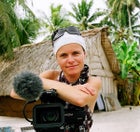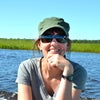The story of climate change is a hard one to tell. It is slow. It is based largely on models and one-by-one weather events and broken temperature events. Unfortunately, it’s a story that is becoming easier to tell. Still, conveying the deep, societal impact of climate change remains difficult.
Earth Operatives
A new ���ϳԹ��� Ethics feature wherein we profile those who work at the intersection of adventure and environmental issues. Briar March.
Briar March.Briar March, a 32-year-old filmmaker from New Zealand, found the story of climate change being played out on Takuu, an isolated atoll in the South Pacific, near Papua New Guinea. Her documentary film, , conveys the threats that the 400 Polynesian inhabitants of the atoll are facing as rising waters threaten to submerge their home and unique culture.
We talked to March about her adventures behind the camera, why she became a filmmaker, and what she’s working on now.
How did you learn about Takuu and the fact that rising seas threaten to submerge it? What attracted you to the story?
I was trying to find a way to tell a story about climate change that reaches the human aspect, and how it impacts us on social and cultural levels. I learned about Takuu in a magazine article—the article was written by Richard Moyle, an ethnomusicologist from Auckland. He had been visiting Takuu for 14 years and was interested in the community because of their music. The traditional music was very Polynesian and not affected by Christianity. [In the article] he mentioned that the island was seeing environmental changes. I was immediately struck by the island as allegory for the whole planet. How they respond to change could be a symbol of how we all respond to climate change.
I grew up in a rural part of New Zealand and had an amazing childhood where I was near the sea and really related to feeling strongly connected to a place. When I thought of an island disappearing, it seemed beyond comprehension. So it was something I had to explore.
Tell us about the process of shooting the film—just getting on and off the atoll sounded like it was very arduous.
It was an insane process. My producer, Lyn Collie, was the mastermind behind the logistics. We took two trips, one in 2006 and another in 2008. There is no phone on the island, just a radio for ships. We had to factor in power and a lot of questions. And what if the camera breaks down? What if our tapes are destroyed? No one in New Zealand speaks the Takuu language, so how are we going to translate it? We were also restricted by the boat, because it only makes four trips per year [and there is no posted schedule]. When we get to Buka [the nearest developed island], we sat around for a few weeks wondering when the boat would leave. The second time we came we chartered a boat.
How did the Takuu people feel about your presence?
Since this film I’ve started filming in other communities and it made me realize how much we were embraced in that community. Everyone was looking out for me, saying hi to me. We got some special treatment.
But on the first trip something dramatic happened. There is this long singing ceremony—they sing all night. Someone had a heart attack and passed away. Everyone immediately changed what they were doing and started wailing quite loudly and I started following what was happening. I asked someone if it’s OK and they said yes, but later I felt not everyone was OK about it. It was a moment when I didn’t know where I should be with my camera. I realized asking questions isn’t enough, because sometimes people don’t say what they really feel.
In another instance, some people didn’t get why we were filming the culture and we had to explain that we were doing that because it’s something that could be lost if they’re forced to retreat from the atoll. Some people felt we would make a lot of money from the film [in an exploitive way]. But good on them for being assertive of their own culture and not wanting to be exploited. In the end, if you spend long enough in a place, and form deep relationships, it will come out in your work.
Your film was released in 2010. Has anything happened to the Takuu culture? Have they been forced to flee?
There has been no mass relocation—it’s a slow-changing process. The water hasn’t risen so high that it’s fully submerged but there are increased flooding events, increased storms, acidification, and things that over time make it harder to live in places like Takuu.
There are other islands that are facing this, too, and of course the Maldives have brought a lot of attention to sea level rise. But Takuu is unique because of its [singular] culture.
In terms of the government—Papua New Guinea is the regional government, but Bougainville is trying to become independent from Papua New Guinea, so really it’s Bougainville that is governing Takuu—they’ve not done anything about it. They talk about relocation but haven’t done anything.
You studied art at the University of Auckland but then attended Stanford University to get a master’s in documentary film and video. What drew you to filmmaking?
I didn’t feel the issues and ideas I was exploring were reaching the audience I wanted to reach. I love the idea that film can be distributed so widely. The potential for reaching people … it seemed like I had so much more access with that medium. So in the last year of art school I started making Allie Eagle and Me [about an artist who was a controversial figure in 1970s New Zealand for her feminist politics]. I didn’t have much training but I learned on the go. After that I dabbled in different types of film work and never really found my feet in terms of a career, because with the ones I was making, you can’t rely on income. With the master’s degree, I can use that to teach.
Your filmography is pretty diverse, including a short you made about Blackfire, a from Arizona. Your current projects range from films about athletes with disabilities to the privatization of public housing in New Zealand. What do you do in your free time?
I don’t have any! When you’re making films like this, it’s immersed into your life. There are huge adventures. I really love traveling and adventure tourism and that style of traveling—you’re going into environments that are not always easy. I think documentary filmmaking is a form of adventure travel. You have to put yourself outside your comfort zone. You can’t expect what will happen next and then you have to get to the finish line and there’s a lot of emotional stuff you’re taking on, too, which is very demanding and tiring. So now I am making a journey into New Zealand, which is really great for me.

